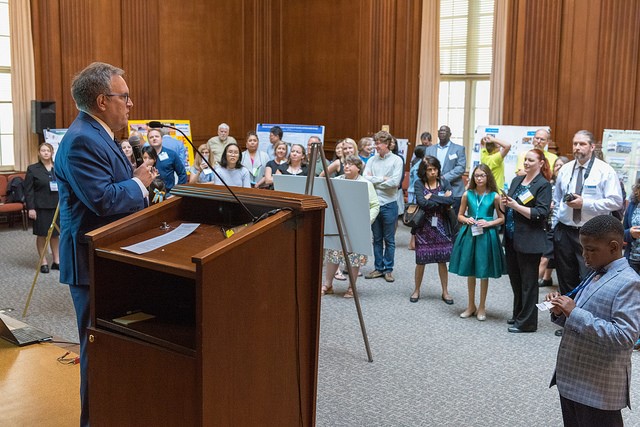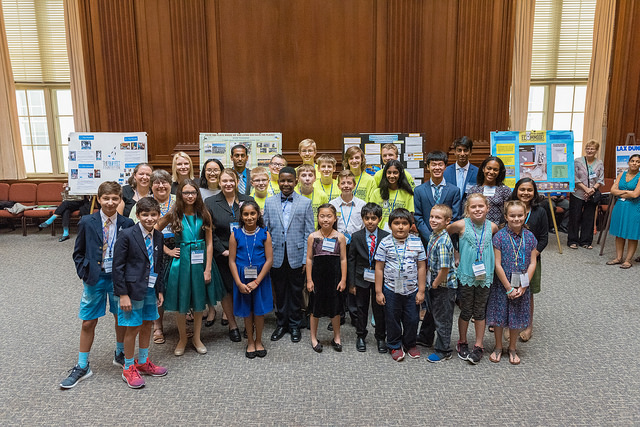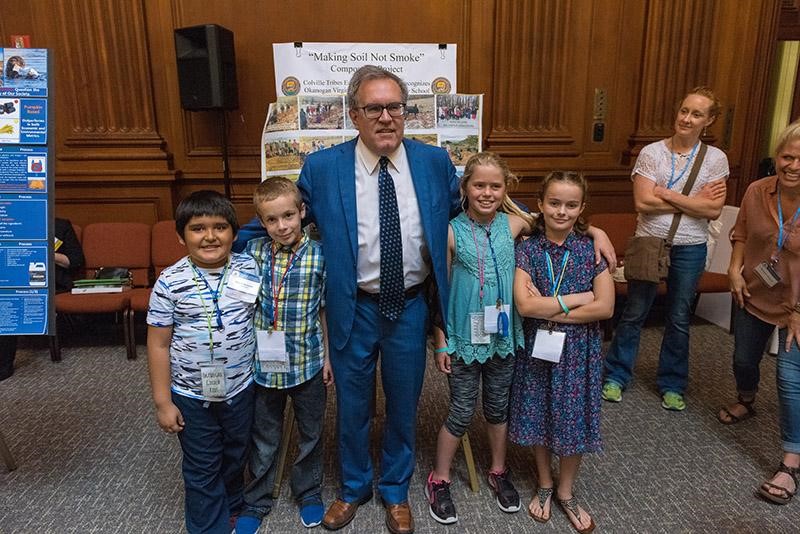| CONTACT: press@epa.gov EPA Honors New Jersey WaterSense Partner for Water Saving Innovation Agency recognizes leading WaterSense Partners in Calif., Fla., Ga., Ind., Minn., Nev., N.C., N.J., Texas, Va. (New York, N.Y. – October 4, 2018) Today, the U.S. Environmental Protection Agency's (EPA) honored 20 water utilities, manufacturers, builders, and organizations for protecting the environment by creating and promoting WaterSense labeled fixtures, homes, and programs. EPA's WaterSense partners have helped Americans save more than 2.7 trillion gallons of water and $63.8 billion on utility bills since 2006. "Through their commitment to water efficiency, our partners are helping to transform the market for water-efficient, high-performing products and homes," said EPA Office of Water Assistant Administrator Dave Ross. "The 2018 EPA WaterSense award winners are making our communities and economy stronger while serving as models for others to follow." The winners were chosen from more than 1,900 WaterSense partners, including utilities, local governments, manufacturers, retailers, distributors, builders, and other organizations who have partnered with EPA to produce and promote water-efficient products, programs, and homes. 2018 Sustained Excellence Award Winners Athens-Clarke County Public Utilities Department (Ga.) received its second Sustained Excellence Award. In addition to hosting consumer events and a pledge drive to reduce water use, the County sponsored an art contest to paint fire hydrants to educate consumers during Fix a Leak Week 2017. The City of Charlottesville (Va.) earned its first Sustained Excellence Award with creative outreach approaches during the region's first significant drought in a decade. The City hosted a 5k family road race during Fix a Leak Week and reached homeowners with water conservation messages during the drought through the weather.com app. Cobb County Water System (Ga.) earned its second Sustained Excellence Award after it addressed a Level 2 drought in 2017 with a new "Drought Busters" outreach campaign. The utility also focused on multifamily water savings by promoting the EPA Water Score tool to help building owners track and improve water use. Metropolitan North Georgia Water Planning District received its first Sustained Excellence Award, focusing on assessments to help homeowners and businesses reduce water use and offering WaterSense labeled toilet rebates to make it easy for them to do so. The District provided its 55 member utilities with toolkits to promote WaterSense campaigns and hosted a Water Drop Dash 5k race. American Standard, part of LIXIL, (N.J.) earned its first Sustained Excellence Award after increasing the number of WaterSense labeled products it distributed to retail outlets by 34 percent in 2017 compared to the previous year. Its innovative, award-winning, water-saving toilets and other products were on display at trade shows and in the company's Beauty in Motion Mobile Showroom throughout 2017. Delta Faucet Company (Ind.) a four-time Sustained Excellence Award winner, promoted its WaterSense labeled products through displays at big-box retailers. It also launched a program to increase awareness of smart home technology devices that help homeowners find leaks and pooling water before they become water waste. KB Home (Calif.) earned its fourth Sustained Excellence Award for its continued commitment to building homes to meet the WaterSense specification. In addition to completing 170 WaterSense labeled homes, the company installed WaterSense labeled plumbing fixtures in all the homes it built in 2017. Energy Inspectors Corporation (Nev.) received its first Sustained Excellence Award. The licensed certification provider inspected and certified all the homes that fellow WaterSense partner KB Home labeled in 2017. To increase its support for the WaterSense labeled home market, the company trained 12 additional raters in 2017. Sonoma-Marin Saving Water Partnership (SMSWP) (Calif.) earned its second Sustained Excellence Award as a professional certifying organization. The Partnership host a certification program that other organizations can adopt to certify irrigation professionals who are trained on water-efficient techniques. To date, SMSWP's Qualified Water Efficient Landscaper program has certified more than 2,500 professionals. 2018 Promotional Partners of the Year EPA also honored four utilities and organizations with the WaterSense Partner of the Year Award: The Broward Water Partnership (Fla.), a collaboration of 18 utilities and municipalities in Broward County, received its first WaterSense Partner of the Year Award for creating a series of YouTube videos promoting water conservation and its toilet rebate program. Citrus County Utilities (Fla.) earned its third Partner of the Year Award for helping students test toilets in schools for leaks, which resulted in identifying 90 leaks. The utility also provided free irrigation audits and distributed hundreds of free WaterSense labeled showerheads and faucet aerators. The City of Fort Worth (Texas) worked with other partners to provide more than 200 water audits and water-efficient landscaping seminars for residents, as well as free facility water use assessments for commercial and institutional customers. The City's SmartFlush Toilet Program distributed more than 3,500 WaterSense labeled toilets to residential low-income and commercial customers. The City of Plano (Texas) held workshops and classes for customers on fixing leaks and repairing sprinklers, in conjunction with WaterSense's Fix a Leak Week and Sprinkler Spruce-Up campaigns. The City also provided free WaterSense labeled showerheads, water-saving faucet aerators, and toilet flappers for Fix a Leak Week and hosted a WaterWise Landscape Tour. Eight WaterSense partners received Excellence Awards to recognize their support for a specific aspect of the program in 2017: - City of Durham Water Management (N.C.), City of Frisco (Texas), and Sacramento Suburban Water District (Calif.), for Excellence in Education and Outreach.
- Alliance for Water Efficiency for Excellence in Strategic Collaboration.
- Sonoma-Marin Saving Water Partnership (Calif.) for Excellence in Promoting WaterSense Labeled Products.
- The Toro Company (Minn.) for Excellence in Education and Public Relations.
- Hunter Industries (Calif.) for Excellence in Labeled Products in the Marketplace.
- San Diego County Water Authority (Calif.) for Excellence in Certification Program Growth.
WaterSense, a partnership program sponsored by EPA, seeks to protect the future of the nation's water supply by offering Americans a simple way to use less water with water-efficient products, homes, and services. WaterSense labeled products, which are independently certified to use at least 20 percent less water and perform as well or better than standard models, have been on the market since 2007. Today there are more than 27,000 labeled models, including products used in residential and commercial bathrooms, commercial kitchens, and outdoor irrigation. EPA's WaterSense program certifies homes with WaterSense labeled fixtures and features. To date more than 1,000 homes have earned the WaterSense label. Learn more about the 2018 WaterSense Award winners at https://www.epa.gov/watersense/watersense-awards. | 






